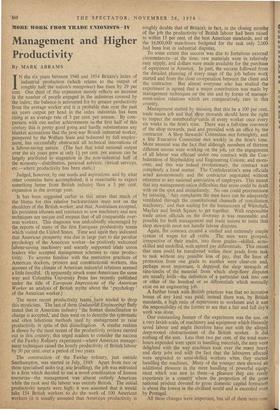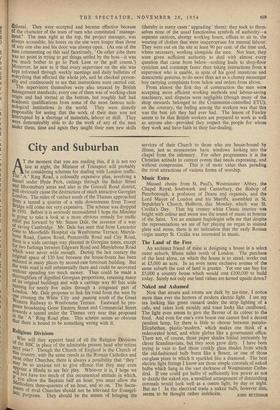MORE WORK FROM TRADE .UNIONISTS—IT
Management and Higher Pioductivity
By MARK ABRAMS IN the six years between 1948 and 1954 Britain's index of industrial production (which relates to the output of roughly half the nation's manpower) has risen by 29 per cent. One third of this expansion merely reflects an increase in the number of people engaged in the industries covered by the index; the balance-is accounted for by greater productivity from the average worker and it is probable that over the past six years output per head in the index industries has been rising at an average rate of 3 per cent. per annum. By com- parison with our earlier achievements in the first half of this century this is pretty good going and hardly substantiates any blanket accusations that the post:war British industrial worker, pampered by the Welfare State ind bolstered by full employ- ment, has successfully obstructed all technical innovations of a labour-saving nature. (The fact that total national output over the six years grew at only 11 per cent. per annum can be largely attributed to stagnation in the non-industrial half of the economy—distribution, personal services, clerical services, etc.—where productivity has been static.) Judged, however, by our needs and aspirations. and by what other countries have accomplished, it is reasonable to expect something better from British industry than a 3 per cent. expansion in the average year.
It has been suggested earlier in this series that much of the blame for this relative backwardness must rest on the shoulders of the British worker, and that, Australians excepted, his persistent idleness and resistance to new machinery and new techniques are unique and surpass that of all comparable over- seas workers. This diagnosis was undoubtedly encouraged by the ,reports of many of the first European productivity teams which visited the United States. Time and again they indicated that American prosperity was due in large part to the peculiar psychology of the American worker—he positively welcomed labour-saving machinery and warmly supported trade union leaders who accepted management schemes to raise produc- tivity. To anyone familiar with the restrictive practices of American dockers, printers and constructional workers, this account of the climate of American industrial relations seemed a little fanciful. (It apparently struck some Americans the same way and Columbia University Press has recently published under the title of European Impressions of the American Worker an analysis of British myths about the ' psychology ' of the American worker.) The more recent productivity teams,. have tended to drop this mysticism. The last of them (Industrial Engineering) flatly stated that in American industry ' the human disinclination to change is accepted,' and then went on to describe the systematic and often laborious methods used' by management to raise productivity in spite of this disinclination. A similar realism is shown by the most recent of the productivity reviews carried out in this country; this urged readers to consider the success of the Fawley Refinery experiment—where' American manage- ment techniques raised the hourly productivity of British labour by 30 per cent. over a period of two years.
The construction of the Fawley refinery, just outside. Southampton, was started in July, 1949'. Apart from two or three specialised tasks (e.g. site levelling), the job was entrusted to a firm which decided to use a novel combination of human resources—the management was almost entirely American while the rank and file labour was entirely British. The initial, productivity targets were high; it was assumed that it would take 154 British workers to do the work of 100 American workers (it is usually assumed that American productivity is roughly double that of Britain); in fact, in the closing month of the job the productivity of British labour had been raised to within 15 per cent. of the best American standards, and of the 16,000,000 man-hours budgeted for the task only 2,000 had been lost in industrial disputes. To some extent this success was due to fortuitous external circumstances—at the time, raw materials were in relatively easy supply, and dollars were made available for the purchase of equipment in America. In part, the success followed from the detailed planning of every stage of the job before work started and from the close co-operation between the client and the contractor. But almost everyone who has studied the experiment is agreed that a major contribution was made by management techniques on the site and by forms of manage- ment-union relations which are comparatively rare in this country. Management started by insisting that this be a 100 per cent. trade union job and that shop stewards should have the right to inspect the membership' cards of every worker once every six weeks in the firm's time. There was a full-time convenor of the shop stewards, paid and provided with an office by the contractor. A Shop Stewards' Committee met fortnightly, and a Site Executive Committee met weekly in the firm's time. More unusual was the fact that although members of thirteen different unions were working on the job, yet the engagement of all labour was effected under one contract with the Con- federation of Shipbuilding and Engineering Unions; and more- over, and this was indeed revolutionary, the contract was completely a local matter. The Confederation's area officials acted autonomously and the contractor negotiated without reference to any national association of employers. This meant that any management-union difficulties that arose could be dealt with on the spot and immediately. No one could procrastinate by intoning, ' Any complaints the men have can be adequately ventilated through the constitutional channels of conciliation machinery.' and then waiting for the bureaucrats of Whitehall, Mayfair and Smith Square to get together. With responsible trade union officials on the doorstep it was reasonable and possible for both management and trade unions to insist that shop stewards must not handle labour disputes. Again, fhe contract created a unified and extremely simple system of wages for all crafts. The men were grouped, irrespective of their trades, into three grades—skilled, semi- skilled and unskilled, with agreed pay differentials. This meant that men could be transferred within their grads from task to task without any possible loss of pay, that the lines of promotion from one grade to another were clear-cut and, perhaps most important, it deprived the shop stewards of nine-tenths of the material from which shop-floor disputes are usually built—the definition of a particular task into one or other of the hundred or so differentials which normally exist on an engineering job.
A further break with British practices was that no incentive bonus of any kind was paid; instead there was, by British standards, a high ratio of supervisors to workmen and it was the responsibility of the former to see that a fair and full day's work was done.
One outstanding feature of the experiment was the use, on a very lavish scale, of machinery and equipment which blatantly saved labour and might therefore have met with the alleged deep-rooted obstructionism of the British worker. It did nothing of the sort. Less than two per cent. of the total man- hours expended were spent in handling materials, the men were delighted with the way machines took over the many heavy and dirty jobs and with the fact that the labourers affected were upgraded to semi-skilled workers when they started handling the machines. Many of the younger men showed an additional pleasure in the mere handling of powerful equip- ment which was new to them—a pleasure they can rarely experience in a country where the proportion of the gross national product devoted to gross domestic capital formation is about the lowest in the civilised world and is exceeded even by Portugal. ditional. They were -accepted and became effective because Of the character of the team of.men who constituted manage- trent.' The man right at the top, the project manager, was always accessible; his hours on the site were longer than those Of any one else and his door was always open. (As one of the then commenting on this said facetiously, ' On -other jobs there Was no point in trying to get things settled by the boss—it was too much bother to go to Park Lane or the golf course.') supervisor on the site was Moreover, he saw to it that every kept informed through weekly meetings and daily bulletins of everything that affected the whole job, and he checked person- ally and continuously to see that instructions were carried out. The supervisors themselves were also unusual by British management standards; every one of them was of working-class Origin and had started at the bottom, but roughly half had keademic qualifications from some of the most famous tech- hological institutions in the world. They were directly responsible for seeing that the work of their men was not Anterrupted by a shortage of materials, labour or skill. They Were demonstrably' able to do the work of any of the men under them; time and again they taught their men new skills (thereby in many cases `upgrading' them); they took to them- selves none of the usual functionless symbols of authority—a separate canteen, shorter working hours, offices to sit in, the wearing of clothes that were inappropriate for manual labour. They were out on the site at least 90 per cent. of the time and, where necessary, working alongside the men. Not least, they were given sufficient authority to deal with almost every question that came from below—nothing leads to shop-floor cynicism and contempt faster than taking instructions from a supervisor who is unable, in spite of his good intentions and democratic gestures, to do more than act as a clumsy messenger boy carrying complaints from below and orders from above.
From almost the first day of construction the men were accepting more efficient working methods and labour-saving machinery, and disputes were negligible (though many of the shop stewards belonged to the Communist-controlled ETU); on the contrary, the feeling among the workers was that this was the best job they had ever had. The lesson of Fawley seems to be that British workers are prepared to work as well as anyone else—provided they respect the people for whom they work and have faith in their fair-dealing.











































 Previous page
Previous page